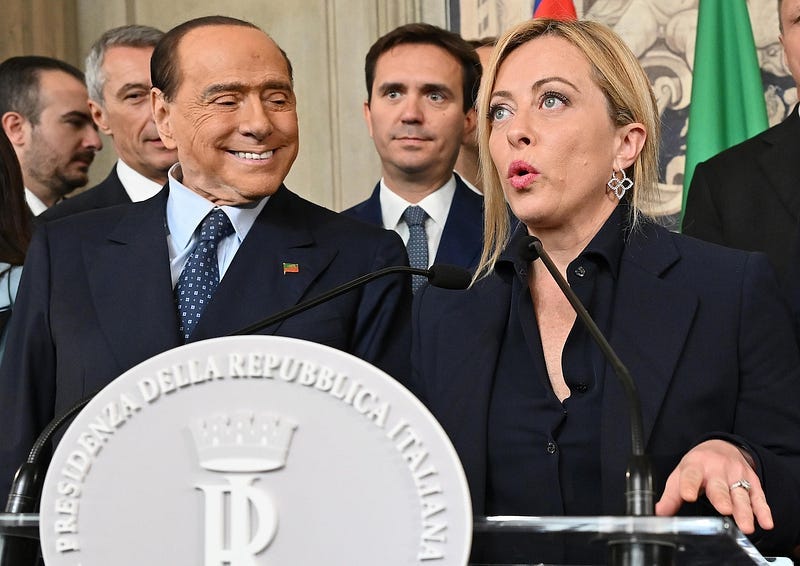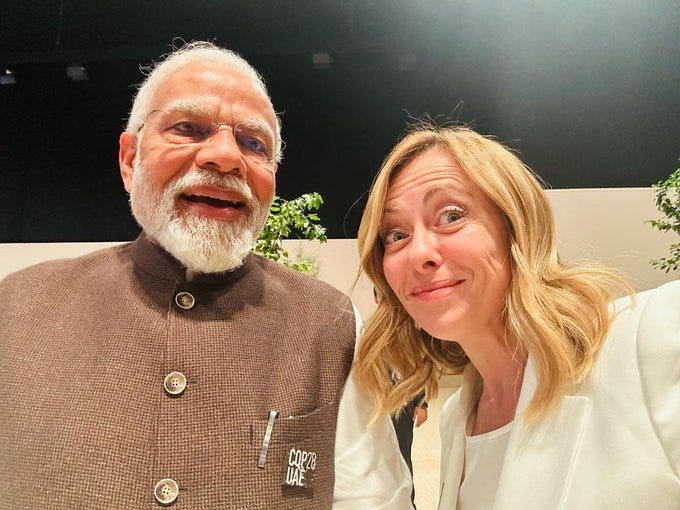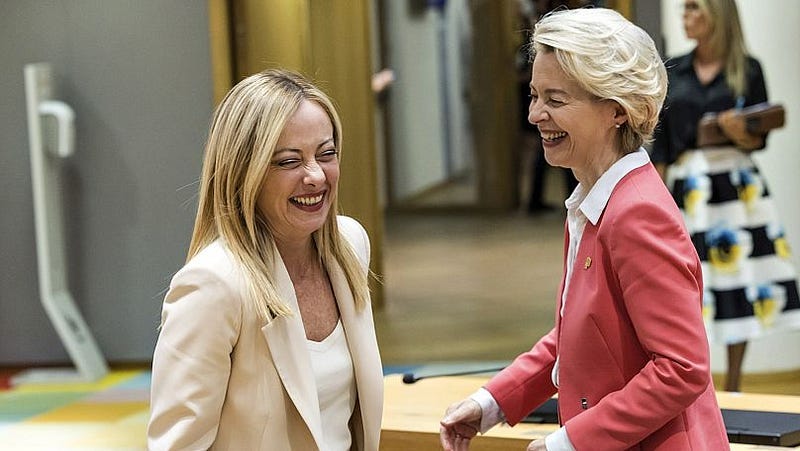Introduction:
Italy is a country in Southern Europe along the Mediterranean Sea. It shares borders with France, Switzerland, Austria, Slovenia and two enclaves: Vatican City and San Marino. It has a rich history and heritage, being the Centre of the Roman Empire. Modern Day Italy is a product of the Second World War. After the crushing defeat of the Fascists by the Allied Powers, a new Republican-style government was set up as per the results of the referendum held in 1946. Italy joined the USA-led World Order, which included taking up membership in the Marshall Plan and in NATO. However, these past 80-odd years have been turbulent for any Prime Minister who has served the country. In October 2022, 2 years ago, Giorgia Meloni, leader of the Fratelli d’Italia (Brothers of Italy) party was elected as the Prime Minister. She was the first female to be elected as the Prime Minister of Italy.

At the time of writing, She had completed 2 years in Office. Given the history of Italian Politics, this is unusual. Italy has seen 68 cabinets in this time, led by 31 different individuals who have served as Prime Minister. Source. This means the average time a cabinet has spent in office is only 13 months. In contrast, India has seen 14 Prime Ministers over 16 national elections in 77 years. This points to a system that is deeply divided and unstable. This is not a miscalculated ploy, but rather, a deliberate action that finds its roots in history. It can be traced back to the rise of Fascism in the 1920s and 30s in Italy, where Benito Mussolini rose to power in a system that was similarly insatiable. He banned all other political parties, turning Italy into a one party state. The post World War-2 Constitution was founded on the basis of Anti-fascism that tried to make sure that a single party could never take over the Italian Legislature. Italy was divided into a bunch of regions before being united under a single Monarch as the Kingdom of Italy. These regional identities persist to this day. This also means that instead of a two party system like the USA, Italian voters have several options to pick from. This makes it difficult for any one party to consolidate power, necessitating the formation of alliances and coalitions with several partners, with each of them having their own demands and concessions. The result of this system was a country that sees elections very regularly, as no coalition is stable enough to last.
This raises a question.
What explains the stability that this government has seen?
The current government led by Prime Minister Meloni looks like an anomaly, an outlier. This is no accident, but rather, the result of a deliberate set of actions and decisions taken by Meloni.
International Cooperation:
Giorgia Meloni has carefully crafted the image of a centrist leader on the international and the European arena. The Meloni Cabinet’s foreign policy has been pro-NATO and in line with the US-led Western Order. It played a significant role in convincing Hungary’s PM Viktor Orbanto to agree to a €50 billion aid to Ukraine in February. This is in stark contrast with other Right Wing figures in Europe, like Marine Le Pen and Geert Wilders, who have called for an end to all aid for Ukraine. She also ended Italy’s participation in China’s Belt and Road Initiative and joined the IMEC (India-Middle East Economic Corridor), which aims to connect India to Ports in Mediterranean Europe, via the Arabian Sea and then land-based transportation through the United Arab Emirates, Saudi Arabia, Jordan, ending in the Haifa Port in Northern Israel. India-Italy relations have also improved to new heights since Meloni came to power. The Enrica Lexie Case as well as the Augusta-Westland Controversy have become a thing of the past. Multiple Agreements were inked between India and Italy, including a Strategic Partnership, Defense Agreement, Government and Business Collaboration, as well as a Migration and Mobility Agreement in 2023 alone. A side-effect of this was Prime Minister Modi of India and Meloni trolling fans together using their portmanteau “Melodi”.

She has also outlined the Mattei Plan for initialItalian investments worth 5.5 Billion Euros in various African states. Meloni endorsed Ursula von der Leyen’s New Pact on Migration and Asylum, much to the chagrin of the European Conservatives and Reformists (ECR) group.The core tenet of the Pact was ”mandatory solidarity”, which means that all member states, regardless of their economic size and geographic location, must contribute to managing the arrival of asylum seekers. This led to von der Leyen making overtures to Meloni to secure her votes, which angered many left-leaning partners of von Der Leyen.

However, not all was sunshine and rainbows for Von Der Leyen vis-a-vis Meloni. The 24 MEPs of FdI were ordered to vote against the re-election of Ursula von der Leyen as president of the European Commission. Although Von Der Leyen won without Meloni’s support, it was a clear message to Brussels — Italy had elected, and was led by, a staunchly right wing government. It would try to disrupt the working of the EU at opportune moments. It voted for the Migration Pact only because Italy is on the frontlines when it comes to receiving migrants sailing in the Mediterranean. The Pact would allow the migrants to go from Italy to other countries in Europe, and hence reduce the pressure on Italy. Meloni passed this off as fulfilling one of her major poll promises — to curb migration into Italy. Meloni has also been firm when dealing with other parties in her Right Wing Coalition. Her vote share in the Italian General Elections was 26%, well above the 9% and the 8% for the Lega Salvini Premier and the Forza Italia respectively. This rose to 28% for the FdI in the European Parliament, showing the FdI has been able to consolidate its voter base. Left-leaning parties, on the other hand, have lost ground, especially the Five Star Movement.
The dealing influx of Illegal Migrants:
Due to its location along the Mediterranean, Italy is the first destination that a lot of migrants from Africa land up at in an effort to seek asylum or economic opportunity in Europe. This has led to a large influx of people in Italy which need to be housed, fed, and taken care of while their asylum applications are processed. Some of these migrants have also led to the law and order situation in some parts of Italy deteriorating. This fueled anti-migrant sentiment in some regions, and that was one of Meloni’s most important poll promises. In addition to Von Der Leyen’s Pact on Migration, Italy also pushed for a 1 Billion USD Deal with Tunisia to tackle the flow of migrants before they can even leave for Italy. Tunisia used these funds to build state capacity to prevent would-be migrants from leaving for Europe. There was also a deal with Albania under which the Italian Navy would move already arrived migrants to Albania until their applications could be processed in exchange for economic aid. This was another important move by Meloni to bolster her support among anti-migrant circles. These three moves were important to fulfill Meloni’s promises of curbing the flow of migrants to Italy, and eventually to the rest of Europe.
Economic Performance of Italy:
Another reason for Giorgia Meloni’s popularity is the economic performance of Italy over the past few years. The Italian Economy had been in doldrums for a very long time and this was exacerbated by the Russia-Ukraine war and resulting sanctions which led to soaring energy costs. Europe heavily relied on Russian gas till 2022. It was crucial for Meloni to secure economic concessions from the European Union as it did during the Covid Pandemic. She also endorsed the Pact on Migration to push asylum seekers towards Northern European Union members to relieve the pressure on its economy. To stimulate economic growth, Italy cut its taxes by 24 Billion USD. Under Meloni, trade with the US and with India reached its highest point ever at 102 Billion USD and 14.9 Billion USD respectively. , EU, and other states across the world. Italy has pushed more trade and Foreign Investment. It has reportedly secured 2 investments of 30 Billion Euros and 4 Billion Euros for 2 data centres. Italy also plays a central role in the India-Middle East-Europe Economic Corridor, with its seaports playing a crucial role as transit hubs. Thus, it would be fair to assume that the FdI under Meloni has been able to expand their voter base on the back of economic growth.
Conclusions:
The tenure of Giorgia Meloni as the Prime Minister of Italy has been surrounded with fears of the rise of neo-fascism amidst an increasing number of alleged Far Right Politicians in Western Europe. However, she has been able to pacify a lot of these fears and has been able to even increase her support base. If she can complete this tenure without the Cabinet being entirely reshuffled, it will mark a monumental change in Italian Politics. It will be one of those rare moments where an Italian Premier could finish their term, bringing about a level of political stability that the country has not seen in a while. Hopefully, if she completes her tenure and
is re-elected, fans will be treated with many more “Melodi” memes.



